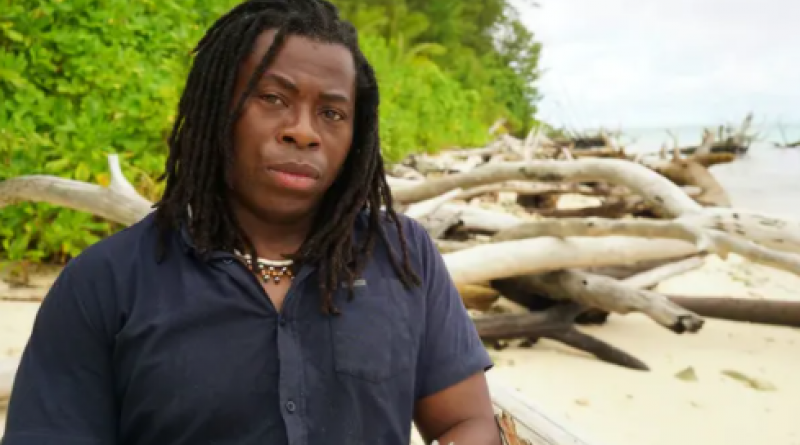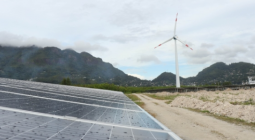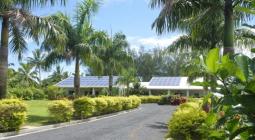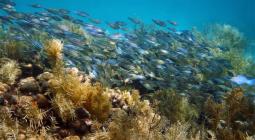Climate Change: Ade on the Frontline review – an intensifying crisis.

Ade Adepitan travels to the Pacific to see how the climate emergency is shrinking the land and killing the future – and to ask what, if anything, can be done to halt the destruction.
Ade Adepitan addresses what he calls “the elephant in the room” fairly early on in his new three-part series, Climate Change: Ade on the Frontline (BBC Two). For the purposes of this show, Adepitan travels first to the Solomon Islands, then to Australia, ending this first stage of his trip in Tasmania. He is, he says, aware that flying to these places is not ideal, but he believes it is important to “see and meet the people being impacted by climate change every day”.
One of the most successful points made by the series is that the people being severely impacted by climate change are rarely the people who have contributed much to its increasingly rapid and destructive march. In the Solomon Islands, he meets a woman who would hop across the water to visit the small island where her grandparents had a home. It used to be dense forest. She shows Adepitan a photograph from 10 years ago, and it looks like paradise. She takes him out to its location on a boat, where dead or dying branches of trees now poke out of the water where paradise once stood. The island is gone. Others nearby are becoming smaller by the year.
In terms of scientific detail, Ade on the Frontline is not particularly dense, but Adepitan makes the interconnectedness of the crisis seem obvious, demonstrating again and again how great the consequences of even the smallest change can be. Cause and effect loom large here. The ocean is rising, which brings salt water on to the islands and into the trees, which are helping to hold the sand and thus the islands together. The salt kills the trees, and when they die, there is nothing left to hold the land together. “It’s like an island graveyard,” says Adepitan.
If that snippet of catastrophe is hard to take, then it only gets worse. Magnificent green sea turtles lay their eggs on Heron Island, on the Great Barrier Reef, but the sand where they lay them is warming up, and that affects the sex of the hatchlings; over the past two decades, 99% of hatchlings have been female. I am all for a feminist turtle utopia myself, but without human intervention, it does not bode well for their breeding future. And on the Australian mainland, in Queensland, the drought is changing the scale and nature of farming, where farming is even still possible. Bushfires have turned parts of the east coast in to a burning hellscape. Sydney is shrouded in smoke, and bats are falling out of trees and dying because of the extreme heat.
This is hard-hitting, because it has to be; few can deny the urgency of the climate crisis now, and the ones who do are looking increasingly as if they live on a different planet to the rest of us. But it also does a solid job of balancing stone-cold reality with the question most people want to hear the answer to, particularly on a Sunday evening: can anything be done to stop it?
As such, Adepitan goes in search of people who are trying to offer solutions. He is not so much a cool, analytical reporter as a presenter who is continually in awe of the magnitude of what he is seeing, but he is clearly very good with people, and is able to convey a message of hope through them. He meets a company redistributing food that would otherwise be thrown away. One third of food produced globally goes to waste every year, leading to emissions that weren’t even necessary in the first place. If we can learn to do more with less, we may be in with a chance of reducing that.
In Tasmania, where Adepitan ends his journey for now, he encounters a scientist attempting to grow giant kelp, to harness its clever carbon-capturing properties, which means catching the invasive sea urchins who love nothing more than a kelp-flavoured snack. If you have ever wanted more information than you know what to do with about sea urchins’ teeth – and anuses, for that matter – then you might be as horrified as Adepitan by the offer of a free and extremely fresh meal.
If it all feels like watching the planet play the last level of Tetris, then there is a possibility that we just may be able to win. Paul Gilding, the former head of Greenpeace, tells Adepitan he believes that if we start to see this as an emergency on the scale of a world war, then we may be in with a chance. We have the technology, we have the wealth, we have the innovations. The message is clear: what we need is action from those in power.
11 April 2021
The Guardian




